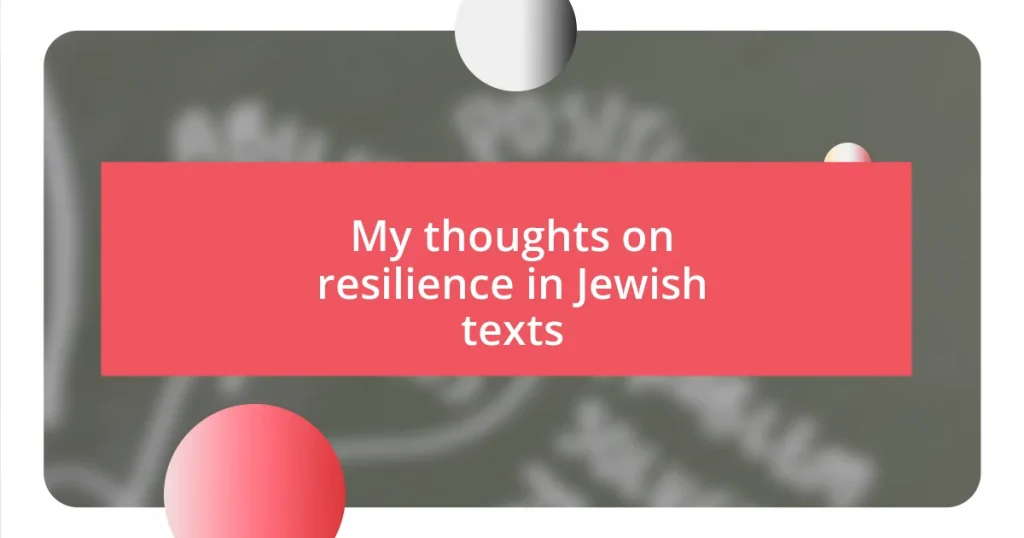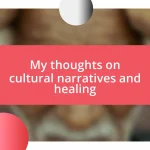Key takeaways:
- The concept of resilience in Judaism emphasizes inner strength, community support, and the acknowledgment of one’s struggles, as illustrated through figures like Job and stories in ancient texts.
- Key Psalms, such as Psalm 27 and Psalm 34, highlight themes of faith, comfort, and the journey from despair to hope, serving as sources of personal solace during challenging times.
- Modern applications of resilience, including acts of kindness, journaling for reflection, and leaning on community support, help individuals navigate personal challenges while reinforcing their inner strength.
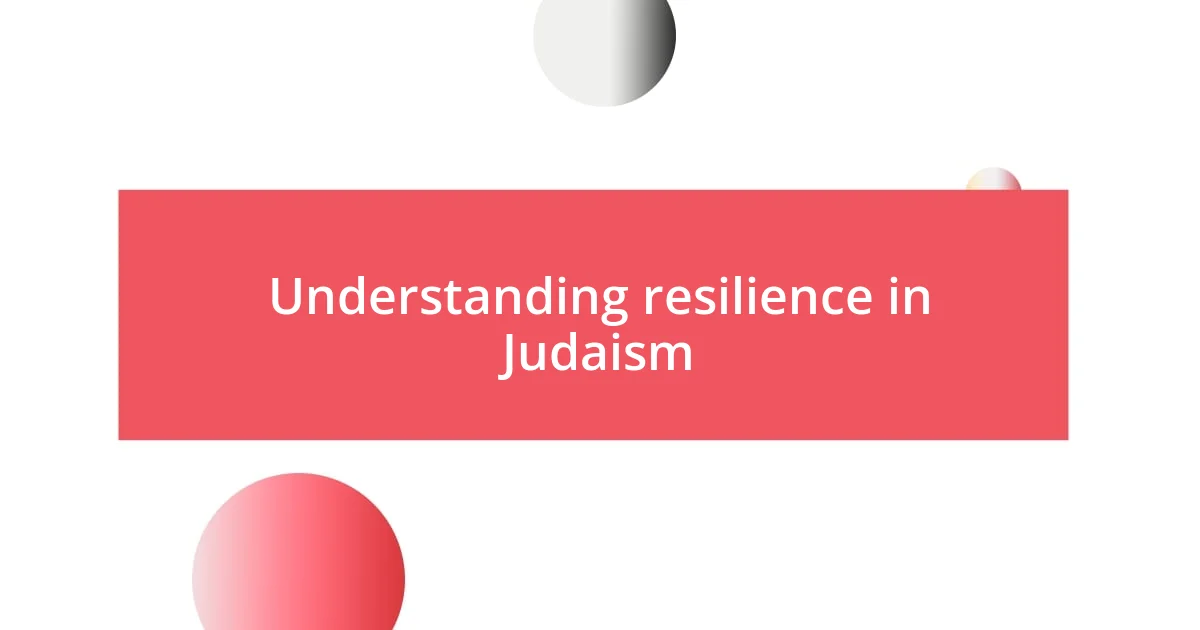
Understanding resilience in Judaism
Resilience in Judaism is often illustrated through the stories of our ancient texts, where figures like Job endure unimaginable hardship yet emerge with renewed strength. I remember reading about Job’s unwavering faith and asking myself, “What would I have done in his shoes?” It made me reflect on my own challenges and how we can all find the inner strength to persevere.
The concept of “tzafun,” or concealed strength, appears frequently in Jewish teachings. It’s as if the texts whisper to us that true resilience isn’t just about the struggles we face but also about the hidden depths we discover within ourselves. This notion resonates with me personally; during difficult times in my life, I often tapped into resources I didn’t even know I had.
Moreover, the Jewish tradition emphasizes community support as a pillar of resilience. When I think back to moments when I faced tough times, I can’t help but recall how friends and family rallied around me. It raises an important question: how much stronger can we become when we lean on one another? This interconnectedness forms a powerful part of our resilience narrative, reminding us that we are never truly alone in our struggles.
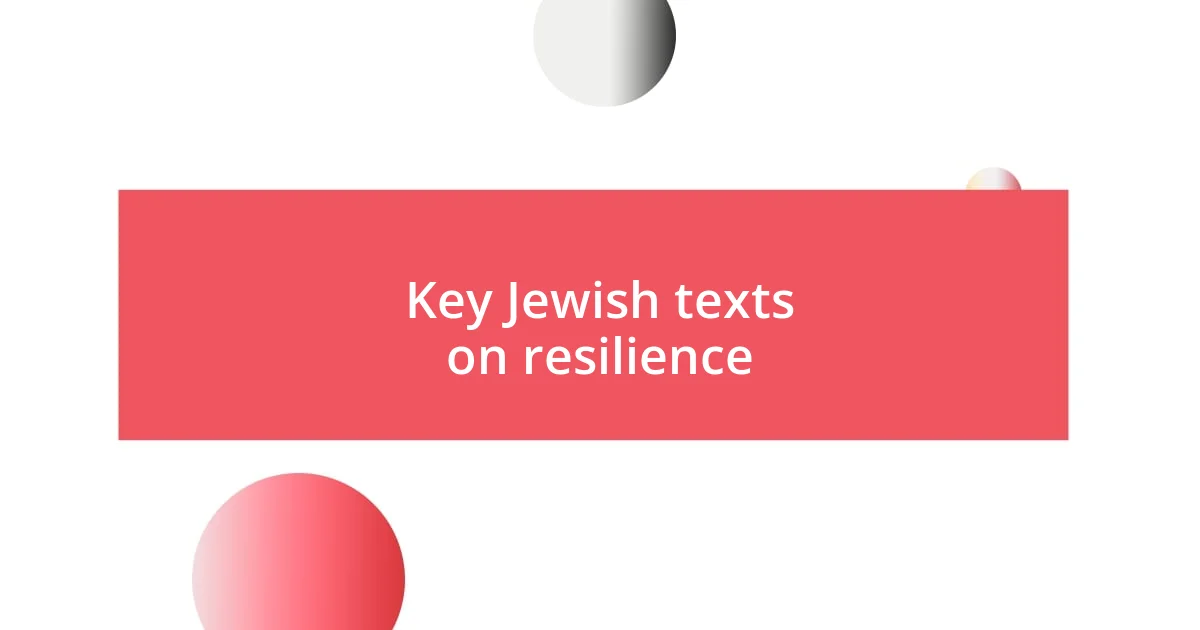
Key Jewish texts on resilience
The book of Psalms is rich in expressions of resilience. For instance, Psalm 27 begins with the powerful affirmation, “The Lord is my light and my salvation; whom shall I fear?” This declaration has been a source of comfort for me during moments of uncertainty. I often turn to this Psalm when I face fears or challenges, reminding myself that faith can illuminate even the darkest paths.
Another key text is the story of Hannah, as told in the Book of Samuel. Hannah’s unwavering devotion, despite her deep personal pain and societal pressures, teaches me that resilience often requires vulnerability. I recall a time when I felt overwhelmed by expectations, much like Hannah; it was through expressing my struggles that I found support and strength. Her story resonates deeply, reminding us that acknowledging our hardships can be a first step toward renewal.
In the Talmud, we encounter the concept of “ma’aseh,” or the deeds of the righteous, which emphasizes the impact of positive actions in the face of adversity. The stories of the sages inspire me, as they exemplify how resilience is woven into our actions. I often draw parallels to my own experiences where small acts, such as reaching out to help a friend in need, foster a sense of purpose during my own life’s storms.
| Text | Resilience Theme |
|---|---|
| Psalms | Faith as a guiding light |
| Hannah | Vulnerability and support |
| Talmud | Actions of the righteous |
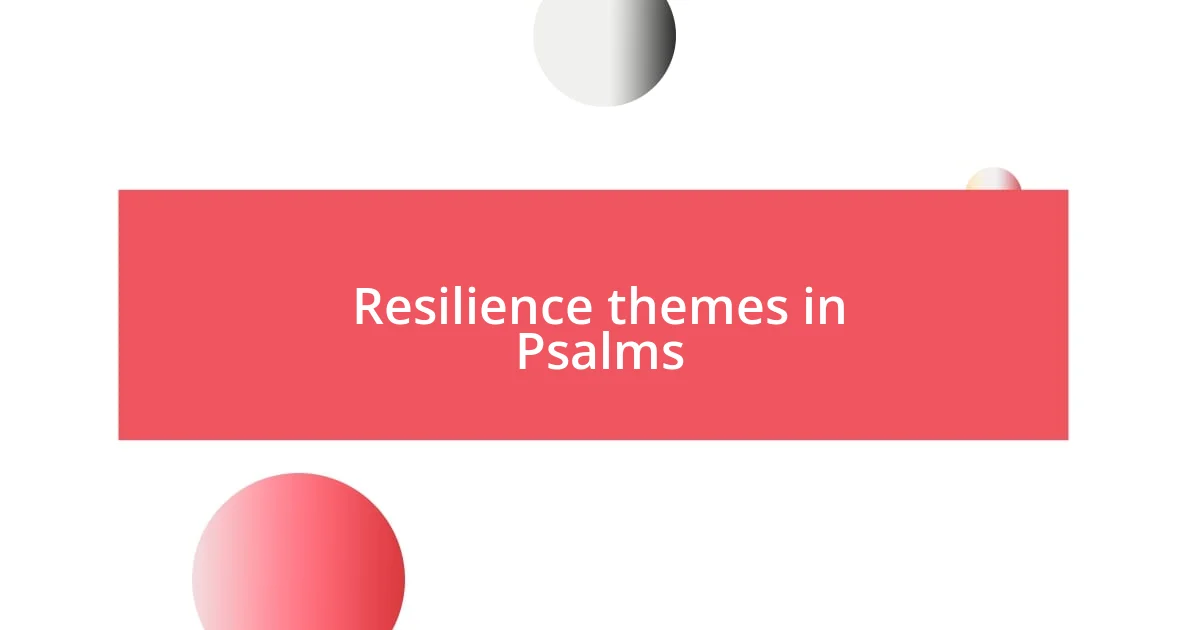
Resilience themes in Psalms
In the Psalms, themes of resilience resonate deeply, often manifesting through expressions of unwavering faith amid despair. One of my personal favorites is Psalm 34, where it states, “The Lord is near to the brokenhearted and saves the crushed in spirit.” This verse reminds me of a time when I felt utterly lost. Just reading those words often brings me solace, as if they were a gentle embrace during my moments of vulnerability.
- Psalm 27: A declaration of courage amidst fear
- Psalm 34: Assurance of comfort for the brokenhearted
- Psalm 40: A plea for help and the promise of renewal
- Psalm 130: Hope in the depths of despair
- Psalm 31: Trust in divine protection during trials
Another profound symbol of resilience in Psalms can be found in Psalm 42, where it speaks of a yearning for hope despite overwhelming sorrow, “Why, my soul, are you downcast? Why so disturbed within me?” I distinctly remember a particularly challenging chapter in my life, where I felt like I was navigating a storm with no end in sight. It was through such verses that I discovered the power of articulating my struggles, transforming my pain into a pathway for healing.
- Psalm 42: The journey from despair to hope
- Psalm 23: Assurance of guidance through life’s valleys
- Psalm 88: Candid expression of deep anguish
- Psalm 121: Trust in divine protection and watchfulness
- Psalm 112: The strength drawn from righteousness amidst adversity
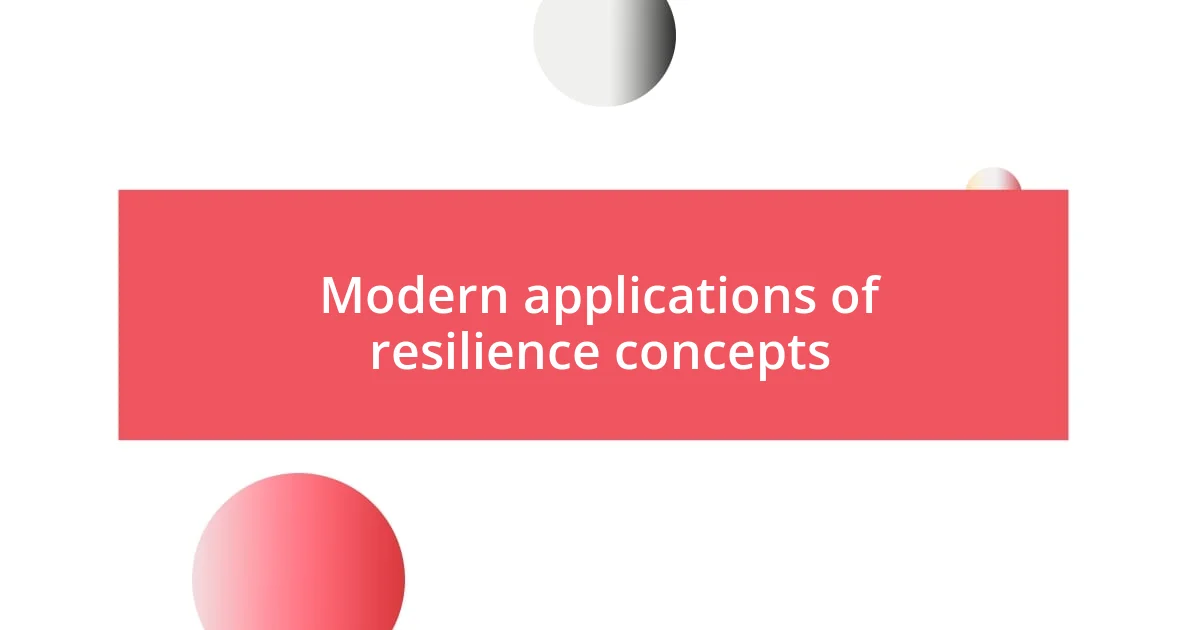
Modern applications of resilience concepts
When we think about resilience in modern life, Jewish teachings offer practical applications that I find incredibly relevant. For instance, the idea of “ma’aseh” inspires me to engage in acts of kindness, reinforcing my own resilience and support networks. Have you ever noticed how helping others can offer a revitalizing boost to your spirit? I remember volunteering at a local shelter during a tough time; not only did I uplift those around me, but I found a renewed sense of purpose in my own life.
Another contemporary application lies in the practice of journaling, which mirrors the reflective nature found in the Book of Psalms. Writing down my thoughts and struggles has been a therapeutic way to process feelings, much like how Psalm 42 poses poignant questions and seeks understanding in despair. I often ask myself, “Where do I find hope amid my challenges?” That introspective dialogue has led me to deeper insights and, ultimately, resilience.
Finally, the emphasis on community in Jewish texts resonates greatly today as well. In times of hardship, I turn to my friends and family, echoing the support that Hannah sought during her trials. There’s a strength in vulnerability, isn’t there? I recall a moment when opening up about my challenges to a close friend led to a heartfelt discussion that not only reassured me but reinforced our bond, underscoring how resilience is often nurtured within a community.
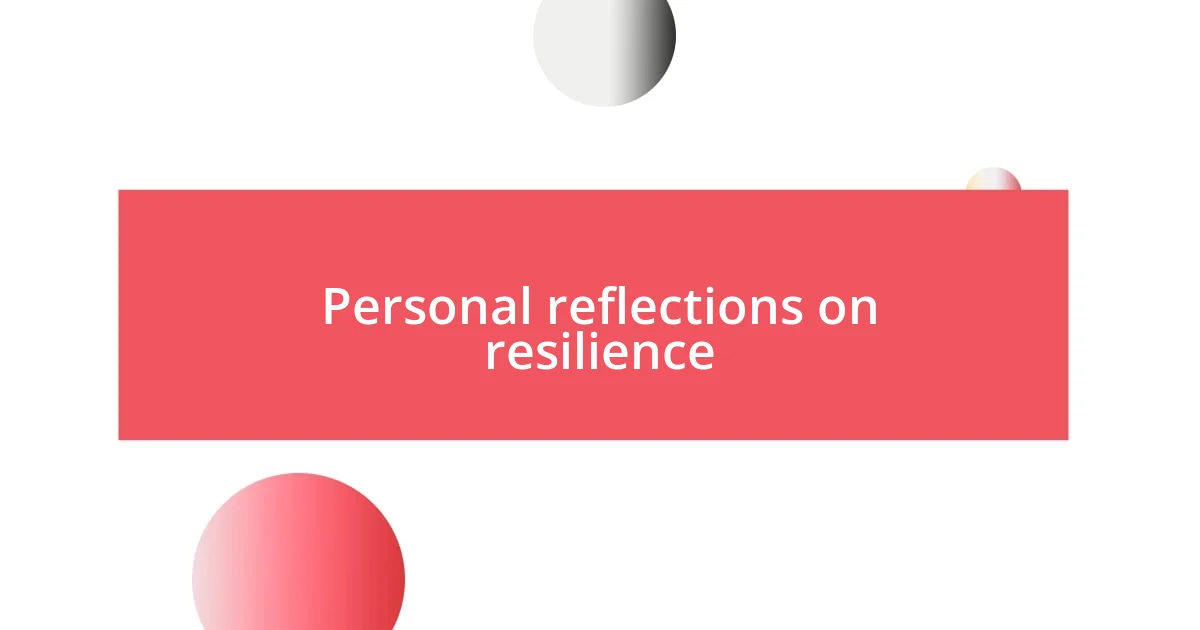
Personal reflections on resilience
Reflecting on resilience often brings me back to moments of profound struggle. One particular time I faced a significant challenge was during my college years when my studies felt overwhelmingly demanding. In those moments, I discovered a deep well of strength within me, inspired by verses like Psalm 40, which highlights renewal through perseverance. It made me realize that resilience isn’t just about enduring; it’s also about embracing the journey of transformation.
I can still vividly recall preparing for a crucial exam while dealing with personal setbacks. I would often read Psalm 31, finding comfort in the idea of trusting in something greater than myself. That thought shifted my perspective from feeling isolated in my struggles to feeling supported. It became clear to me that my faith and the wisdom in these texts were guiding me through the turbulence, reminding me that even in despair, I was never truly alone.
Through these experiences, I’ve understood that resilience is not a solitary endeavor; it thrives in connection. Have you ever felt the comforting presence of community when you needed it the most? For me, sharing my struggles with close friends allowed me to transform my vulnerabilities into a source of collective strength. It’s this intertwining of personal and communal resilience that resonates with me, illustrating that our journeys are often enriched by those we choose to walk alongside.










